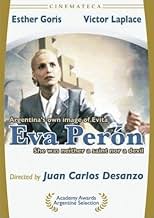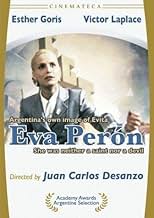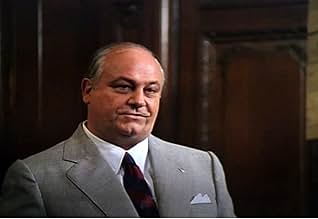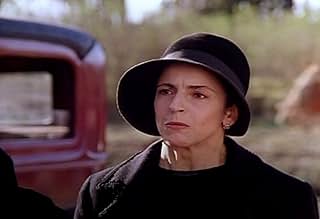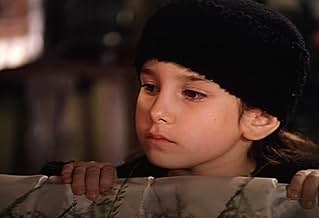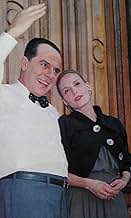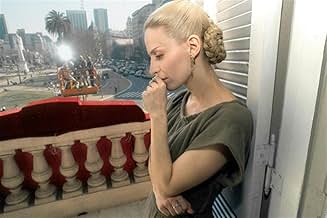Drama based on the life of Eva Peron, an obscure actress, who rose to become wife of Argentine strong-man President Juan Peron and one of the most powerful figures in Argentina until her dea... Read allDrama based on the life of Eva Peron, an obscure actress, who rose to become wife of Argentine strong-man President Juan Peron and one of the most powerful figures in Argentina until her death in 1952 at age 33.Drama based on the life of Eva Peron, an obscure actress, who rose to become wife of Argentine strong-man President Juan Peron and one of the most powerful figures in Argentina until her death in 1952 at age 33.
- Awards
- 4 wins & 4 nominations total
- Director
- Writer
- All cast & crew
- Production, box office & more at IMDbPro
Featured reviews
Eva Perón is the most emblematic female figure in all of Argentina and among many people who were involved in the Argentine government, Eva proved to be the most dignified and humble. Something that Argentina will never have again. Few films have been made about this famous historical figure and this present film was released a few months before Alan Parker's version. Each director who has made these films has narrated the figure of Eva Perón from her perspective, but without separating herself from how very significant she has been for the Argentine people. This film directed by Juan Carlos Desanzo makes an effort to respect the figure of Eva and although it is a film that has been somewhat forgotten, there is no doubt that it is one of the best films in Argentine cinema. The film focuses a lot on Eva's rise as a possible vice president and how her opportunity to reach beyond the top was interrupted due to cancer. Surely we expected to see Eva's entire life and her beginnings are only summarized in two flashbacks about her father's funeral and her first meeting with Perón. The film gives quite a bit of relevance to the figure of Eva and the way in which she has challenged the norms and prejudices established by the oligarchy. The script gives a very good depth to that and also to Eva as a character. We see in the film that she was a woman who has suffered a lot of stigmatization for being an illegitimate daughter due to the prejudices of the time. That was something that Eva wanted to change and the film makes her objective very clear in order to understand the change she wanted to propose. Esther Goris gives a fairly strong and believable performance as Eva making her dominate the entire film. You can see the firm and defiant character with which Eva challenged the oligarchy and has earned her the affection of many. We see a pretty strong and feisty Eva who is determined to try to achieve the goal of being the leader that Argentina needed. Even when she falls ill, she still continues to fight and resist quite stoically, leading her to become the martyr that she currently is. In that area, Esther offers a performance worthy of an Oscar award and even Víctor Laplace also offers a great performance as a Juan Domingo Perón who is present when Eva needs him. What is true is that the film leaves out a couple of events that could have contributed a lot and Alan Parker's version is the one that has made the effort to try to tell the complete story. This film also deserves a certain appreciation for offering a fairly realistic and human portrait of Eva Perón in her fight to create a better Argentina for those most in need. My final rating for this movie is a 9/10.
EVA PERON was Argentina's official submission to the 1996 Oscars for Best Foreign Film. It was obviously spawned by the filming of EVITA with Madonna, in Argentina. A self-proclaimed Argentinian vesion of the "true" Eva Peron saga, (though some Argentinians will insist the not always accurate EVITA is actually closer to the truth, and more importantly, tells Eva's story more interesting) EVA PERON is no memorable epic. It suffers badly from comparison with EVITA on virtually all counts, not the least of which is the all too obvious low, low budget, which makes the film seem amateurish. Its saving grace is ESTHER GORIS. This wonderful Argentine actress makes the best of the script she was handed. Check her out in the recently release DONA BARBARA, in the title role. In that infinitely more spectacular, and better written Argentine film,(EVA PERON resembles a 60's TV theater feature, not even proper cinema) she is riveting. That performance suggests how much better EVA PERON would have been, if only the gifted Goris had been given a good script. Rent it only if you (as I and many do) want to see more of Esther Goris, or if you're a fan of Argentine cinema.
María Eva Duarte (later known as Evita) was born out of wedlock in 1919 in the village of Los Toldos in Buenos Aires Province, the youngest of five children. Her father (as that of her siblings) was a wealthy married landowner who allowed the children to carry his name, but they were cut off from Duarte's family, lived in borderline poverty and were shunned as illegitimate, a serious stigma at the time.
In her late teens she moved to Buenos Aires and had considerable success as a model and radio actress. She had a short lived film career, but none of her movies were hits (they can be seen in You Tube). She met Colonel Juan Domingo Perón, an up-and-coming politician at the time Secretary of Labor, and married him. The military, wary of Peron's growing popularity among workers arrested him on October 1945. A few days later half a million supporters gathered in front of the Government House and demanded Peron's freedom. The military, scared, complied. Perón was a candidate in the 1946 elections at the head of his own party, and won by a landslide.
Perón's government was populist (not understood as a negative). Working conditions were ameliorated and worker's rights were taken seriously. Certain professions (e. G. rural and domestic workers) were regulated by the first time. There was much progress in public health: the number of hospital beds was duplicated and endemic diseases like malaria were eradicated. New hospitals were built, some in remote regions until then deprived of medical care. Trade unions were supported, but also controlled by the government. Eva, now Evita, was a very visible First Lady. She started the Eva Peron Foundation, a charitable organization that built homes, hospitals and schools in underprivileged areas and assisted the poor in various ways. Evita was a complex personality. She was instrumental in ensuring women's right to vote in Argentina, sanctioned in 1947, and tirelessly supported women's participation in politics. Yet, in her only book, La Razón de mi Vida, The Reason of my Life she stressed her subordinate role next to Peron. She was warm and generous with friends but a dangerous enemy.
Evita's death from cancer in July 1952 elicited the largest outpouring of grief ever seen in Argentina. Not from the military and moneyed classes though; among them her passing was celebrated. Her demise took the wind out of the sails of Peron's government; it grew increasingly corrupt and oppressive until was overthrown by a military uprising in September 1955. The subsequent military dictatorship was as afraid of Evita dead as alive; they feared her tomb would become a place of pilgrimage. Her embalmed corpse was stolen and, after various vicissitudes interred under an assumed name in a Milan cemetery. Finally, in 1970 her remains were repatriated and now rest in the Duarte family vault.
After her death, Evita's memory was relentlessly reviled. A overheated "biography," Woman with the Whip was published in 1952, its ludicrous fabrications echoed by the Argentine mainstream press after 1955. A cartoonish Eva Peron based on the book was presented in the musical Evita (1976) and put on screen in 1996. Today, a more sensible view prevails, exemplified in this movie. Script writer José Pablo Feinmann does not try for a complete biography but enough is shown to give a good picture of Argentina under Peron. Although the film is broadly favorable to Eva, it is not a whitewash; the good and the bad are there. Acting is excellent. Victor Laplace has been made up to look uncannily like Peron and has captured all his mannerisms. Esther Goris does an outstanding job of reconstructing Evita in public and private settings. All in all, a balanced and fair look at an important historic personage.
In her late teens she moved to Buenos Aires and had considerable success as a model and radio actress. She had a short lived film career, but none of her movies were hits (they can be seen in You Tube). She met Colonel Juan Domingo Perón, an up-and-coming politician at the time Secretary of Labor, and married him. The military, wary of Peron's growing popularity among workers arrested him on October 1945. A few days later half a million supporters gathered in front of the Government House and demanded Peron's freedom. The military, scared, complied. Perón was a candidate in the 1946 elections at the head of his own party, and won by a landslide.
Perón's government was populist (not understood as a negative). Working conditions were ameliorated and worker's rights were taken seriously. Certain professions (e. G. rural and domestic workers) were regulated by the first time. There was much progress in public health: the number of hospital beds was duplicated and endemic diseases like malaria were eradicated. New hospitals were built, some in remote regions until then deprived of medical care. Trade unions were supported, but also controlled by the government. Eva, now Evita, was a very visible First Lady. She started the Eva Peron Foundation, a charitable organization that built homes, hospitals and schools in underprivileged areas and assisted the poor in various ways. Evita was a complex personality. She was instrumental in ensuring women's right to vote in Argentina, sanctioned in 1947, and tirelessly supported women's participation in politics. Yet, in her only book, La Razón de mi Vida, The Reason of my Life she stressed her subordinate role next to Peron. She was warm and generous with friends but a dangerous enemy.
Evita's death from cancer in July 1952 elicited the largest outpouring of grief ever seen in Argentina. Not from the military and moneyed classes though; among them her passing was celebrated. Her demise took the wind out of the sails of Peron's government; it grew increasingly corrupt and oppressive until was overthrown by a military uprising in September 1955. The subsequent military dictatorship was as afraid of Evita dead as alive; they feared her tomb would become a place of pilgrimage. Her embalmed corpse was stolen and, after various vicissitudes interred under an assumed name in a Milan cemetery. Finally, in 1970 her remains were repatriated and now rest in the Duarte family vault.
After her death, Evita's memory was relentlessly reviled. A overheated "biography," Woman with the Whip was published in 1952, its ludicrous fabrications echoed by the Argentine mainstream press after 1955. A cartoonish Eva Peron based on the book was presented in the musical Evita (1976) and put on screen in 1996. Today, a more sensible view prevails, exemplified in this movie. Script writer José Pablo Feinmann does not try for a complete biography but enough is shown to give a good picture of Argentina under Peron. Although the film is broadly favorable to Eva, it is not a whitewash; the good and the bad are there. Acting is excellent. Victor Laplace has been made up to look uncannily like Peron and has captured all his mannerisms. Esther Goris does an outstanding job of reconstructing Evita in public and private settings. All in all, a balanced and fair look at an important historic personage.
This Argentine feature was release around the same time as Alan Parker's film version of the hit musical "Evita". For those interested in learning about Argentina's controversial first lady, I recommend both films. Desanzo's version is lower-budget and therefore not as spectacular as Parker's interpretation, but "Eva Perón" is more historically accurate and fair in it's treatment of Evita. At least when compared to what has been written about her in a historical context.
The film deals with the final stages of Eva Perón's life. It chronicles her bid for the vice-presidency and her illness in detail. Other stages of her short life, childhood, artistic years, etc, are seen in flashbacks.
My only (minor) complaint lies with, surprisingly, Esther Goris. I say surprisingly because her performance is great (more on this a little later) and she does resemble Eva Perón during her final stages but when playing the younger Eva Duarte de Perón or the actress Eva Duarte, Goris doesn't even come close in her resemblance. Maybe it's because I have seen one too many pictures of the historical woman pre-1950 (before her disease) and the differences in physical appearance are too apparent. The real Eva's beauty was more radiant, her hair more elaborate and her body was more voluptuous in those earlier years. Goris is too thin, to abrasive and does not possess the softness that is evident in pictures or newsreel footage of the young Evita during her earlier years as the First Lady. I usually have difficulties watching a bio-film when the leading actor does not resemble the person they are portraying. I had a similar problem with Leonardo DiCaprio portraying Howard Hughes in "The Aviator".
Goris's voice and personality are also too over-bearing. Granted, the real Eva, according to many, was just that and her voice was indeed shrill when giving her impassioned speeches on the balcony of the Casa Rosada but during her less intense speeches and moments such as speaking to her Descamisados over the radio, her voice was calm and peaceful. According to those who knew her best, she also had a sweet and gentle side to her. That's not really seen in this film. Eva Perón was a diamond with some rough edges, Goris is rough around the edges.
With that said, since Goris is portraying Eva during her final years, for the most part, she does indeed capture her essence physically and vocally and her performance is riveting. Like Madonna in Parker's film, Goris appears to have become Eva Perón and her passion for the role is evident in this performance.
Those thinking that this Argentine version will portray Eva as a saintly deity may be shocked. This interpretation portrays an Eva Perón who liked to wear nice clothes and hats but had the will of a survivor. A strong woman who talked the talk and walked the walk and was able to change, for good or bad (take your pick), an entire nation forever due to her overwhelming fire and passion. This is a much tougher Evita than in Parker's film and if Madonna's Evita and Goris' Evita would ever face off in a boxing ring, Goris' Eva would stand victorious.
Despite my above comments, Esther Goris is outstanding in her portrayal and the production as a whole is excellent. Considering the tremendous amount of misinformation about the real woman on film: "Little Mother", "Evita Peron" (starring the mis-cast Faye Dunaway) and even the rock opera, this film is a blessing. And for those, like me, who are thirsty for something more truthful to history, we finally have a film that is pretty accurate historically and unbiased in it's treatment of it's leading lady and her legacy.
7.5 out of 10.
The film deals with the final stages of Eva Perón's life. It chronicles her bid for the vice-presidency and her illness in detail. Other stages of her short life, childhood, artistic years, etc, are seen in flashbacks.
My only (minor) complaint lies with, surprisingly, Esther Goris. I say surprisingly because her performance is great (more on this a little later) and she does resemble Eva Perón during her final stages but when playing the younger Eva Duarte de Perón or the actress Eva Duarte, Goris doesn't even come close in her resemblance. Maybe it's because I have seen one too many pictures of the historical woman pre-1950 (before her disease) and the differences in physical appearance are too apparent. The real Eva's beauty was more radiant, her hair more elaborate and her body was more voluptuous in those earlier years. Goris is too thin, to abrasive and does not possess the softness that is evident in pictures or newsreel footage of the young Evita during her earlier years as the First Lady. I usually have difficulties watching a bio-film when the leading actor does not resemble the person they are portraying. I had a similar problem with Leonardo DiCaprio portraying Howard Hughes in "The Aviator".
Goris's voice and personality are also too over-bearing. Granted, the real Eva, according to many, was just that and her voice was indeed shrill when giving her impassioned speeches on the balcony of the Casa Rosada but during her less intense speeches and moments such as speaking to her Descamisados over the radio, her voice was calm and peaceful. According to those who knew her best, she also had a sweet and gentle side to her. That's not really seen in this film. Eva Perón was a diamond with some rough edges, Goris is rough around the edges.
With that said, since Goris is portraying Eva during her final years, for the most part, she does indeed capture her essence physically and vocally and her performance is riveting. Like Madonna in Parker's film, Goris appears to have become Eva Perón and her passion for the role is evident in this performance.
Those thinking that this Argentine version will portray Eva as a saintly deity may be shocked. This interpretation portrays an Eva Perón who liked to wear nice clothes and hats but had the will of a survivor. A strong woman who talked the talk and walked the walk and was able to change, for good or bad (take your pick), an entire nation forever due to her overwhelming fire and passion. This is a much tougher Evita than in Parker's film and if Madonna's Evita and Goris' Evita would ever face off in a boxing ring, Goris' Eva would stand victorious.
Despite my above comments, Esther Goris is outstanding in her portrayal and the production as a whole is excellent. Considering the tremendous amount of misinformation about the real woman on film: "Little Mother", "Evita Peron" (starring the mis-cast Faye Dunaway) and even the rock opera, this film is a blessing. And for those, like me, who are thirsty for something more truthful to history, we finally have a film that is pretty accurate historically and unbiased in it's treatment of it's leading lady and her legacy.
7.5 out of 10.
Did you know
- TriviaOfficial submission of Argentina for the 'Best Foreign Language Film' category of the 69th Academy Awards in 1997.
- ConnectionsVersion of Little Mother (1972)
- How long is Eva Peron: The True Story?Powered by Alexa
Details
- Release date
- Country of origin
- Language
- Also known as
- Eva Peron: The True Story
- Filming locations
- Production companies
- See more company credits at IMDbPro
- Runtime
- 2h(120 min)
- Color
- Sound mix
- Aspect ratio
- 1.66 : 1
Contribute to this page
Suggest an edit or add missing content

